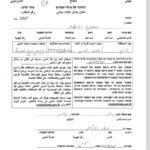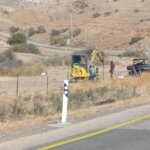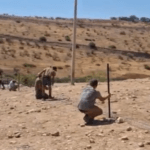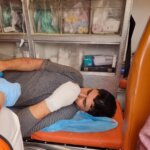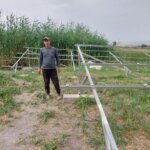Let the children play
Residents of Zubeidat have levelled the hillside to create a football pitch, less than 100 meters from the illegal Israeli settlement of Argaman. For years local sheep farmers used the rocky hillside to graze their sheep, and the children of this overcrowded village played on the hillside above their homes.
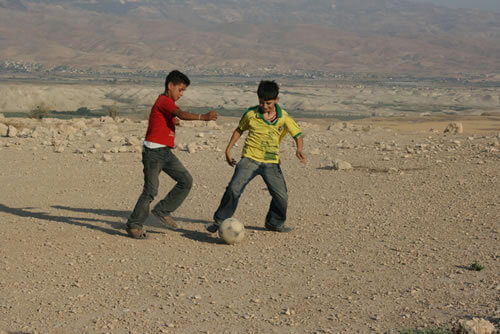
However, people have gradually stopped going there, scared away by harassment from settlers, Israeli army jeeps patrolling the settlement road, and an army watch tower only metres away. This has left local children with nowhere to play. There are two schools in the village, attended by 700 children, but there is not enough space for them to have a playground. The buildings are so tightly packed that this village closely resembles a refugee camp, and is one of the most overcrowded areas in Palestine.
By creating a football pitch the Mayor of Zubeidat, along with the local residents, have reclaimed their right to use the land: an act of resistance aiming to forestall attempts by the settlers or army to steal the land from them. They all gathered in the early hours of a Saturday morning in March and, with the help of 5 bulldozers, shifted rocks to level a huge playing field. 5 lorries also came full of top soil, to finish the job off late in the evening. When the illegal settlers from Argaman discovered what was happening, they approached the Palestinians and told them to stop work, claiming that the settlement owned the land. However, the residents of Zubeidat have no intention of stopping. They returned on Friday 10th April they returned and continued to work until Israeli Army came and confiscated the ID of one of the drivers.
This is just the start of a project. So far they have levelled an area 10.000m2 wide and covered it with 6000m3 of top soil. When it is completed there will be a play area and football pitch for the youth club’s three teams, (children, youth and adults) which are already considered to be ‘the best in the valley’ despite their lack of facilities.
All 1800 inhabitants of Zubeidat are descended from the extended Zubeidat family, who were driven from their homes in Israel’s ethnic cleansing program of 1948. They settled in the Jordan Valley, but their village was not designated as a refugee camp as the Jordanian government gave them enough land to build houses and farm. That land has gradually been taken from them since Israel occupied the West Bank in 1967.
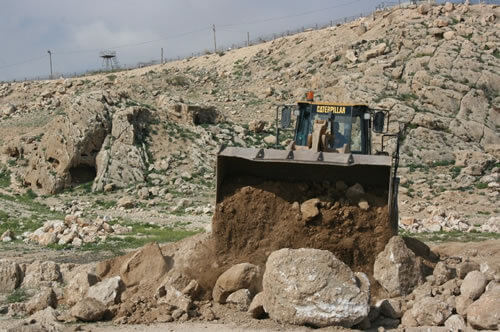
Firstly, all the farm land they had within a kilometer of the Jordan River was confiscated and fenced off as a ‘closed military area’ (recently settlers have been given access to this stolen land so that they can farm it). In 1968 Argaman settlement was established on the top of the nearby hill. They took some of the most fertile land and two water wells that Zubeidat residents used to irrigate their crops. With the creation of the settlement came repression by the Israeli Army: there was intense pressure on Palestinian farmers to stop grazing their sheep and access to water was severely restricted. There were curfews from sunset to sunrise, when they were not allowed onto their farmland to tend their livestock.
Then, under the Oslo Accords of 1993, a line was drawn around the existing built up area that covered 42 dunums, and the Palestinians are not allowed to build outside this area.
However, the history of the village is not one of passive acceptance of their fate. As the Mayor said to visitors from the UK and Italy in November 2008: “We were determined not to become refugees again”.
On the hillside, just 60 meters from the new football pitch, sits the Mayor’s house and a big square water tank on stilts. This water tank provides water for the whole village and the water is piped by the Israeli water company, Mekarot. It is a testament to local resilience.
When politicians and bureaucrats sat down in 1993 and drew a line on a map – deciding which parts of Zubeidat would be area B (with limited rights for local Palestinians) and which parts would be Area C (under direct control of the Israeli military) they made a small error. The Zubeidat’s were only supposed to have the land in the valley, but by the slip of a pen had managed to keep the hillside too. By erecting the water tank a few years ago they were able to initiate a court battle that established their right to the land. By moving another 60 meters up the hill and levelling the land for a football pitch, they are now securing their right to use the land that is rightfully theirs.

